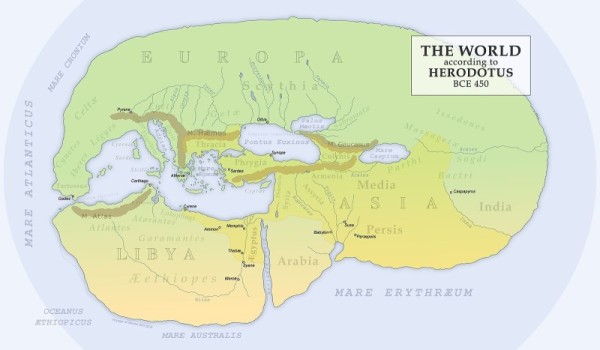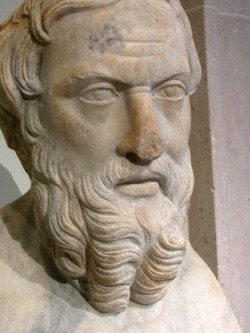. . . the Scythians being delighted with the vapor-bath howl like wolves. This is to them instead of washing, for in fact they do not wash their bodies at all in water.

Translated by Lord Macaulay — our special project presenting the complete Herodotus with URLs for all of those people, places, events, and things which baffles and discourages modern readers.
Previously on Herodotus
74. Now they have hemp growing in their land, which is very like flax except in thickness and in height, for in these respects the hemp is much superior. This grows both of itself and with cultivation; and of it the Thracians even make garments, which are very like those made of flaxen thread, so that he who was not specially conversant with it would not be able to decide whether the garments were of flax or of hemp; and he who had not before seen stuff woven of hemp would suppose that the garment was made of flax.
75. The Scythians then take the seed of this hemp and creep under the felt coverings, and then they throw the seed upon the stones which have been heated red-hot: and it burns like incense and produces a vapor so think that no vapor-bath in Hellas would surpass it: and the Scythians being delighted with the vapor-bath howl like wolves. This is to them instead of washing, for in fact they do not wash their bodies at all in water. Their women however pound with a rough stone the wood of the cypress and cedar and frankincense tree, pouring in water with it, and then with this pounded stuff, which is thick, they plaster over all their body and also their face; and not only does a sweet smell attach to them by reason of this, but also when they take off the plaster on the next day, their skin is clean and shining.
76. This nation also is very averse to adopting strange customs, rejecting even those of other tribes among themselves, but especially those of the Hellenes, as the history of Anacharsis and also afterwards of Skyles proved. For as to Anacharsis first, when he was returning to the abodes of the Scythians, after having visited many lands and displayed in them much wisdom, as he sailed through the Hellespont he put in to Kyzicos: and since he found the people of Kyzicos celebrating a festival very magnificently in honor of the Mother of the gods, Anacharsis vowed to the Mother that if he should return safe and sound to his own land, he would both sacrifice to her with the same rites as he saw the men of Kyzicos do, and also hold a night festival. So when he came to Scythia he went down into the region called Hylaia (this is along by the side of the racecourse of Achilles and is quite full, as it happens, of trees of all kinds),—into this, I say, Anacharsis went down, and proceeded to perform all the ceremonies of the festival in honor of the goddess, with a kettle-drum and with images hung about himself. And one of the Scythians perceived him doing this and declared it to Saulios the king; and the king came himself also, and when he saw Anacharsis doing this, he shot him with an arrow and killed him. Accordingly at the present time if one asks about Anacharsis, the Scythians say that they do not know him, and for this reason, because he went out of his own country to Hellas and adopted foreign customs. And as I heard from Tymnes the steward of Ariapeithes, he was the uncle on the father’s side of Idanthyrsos king of the Scythians, and the son of Gnuros, the son of Lycos, the son of Spargapeithes. If then Anacharsis was of this house, let him know that he died by the hand of his brother, for Idanthyrsos was the son of Saulios, and Saulios was he who killed Anacharsis.

CC BY-SA 2.0 image from Wikipedia.
77. However I have heard also another story, told by the Peloponnesians, that Anacharsis was sent out by the king of the Scythians, and so made himself a disciple of Hellas; and that when he returned back he said to him that had sent him forth, that the Hellenes were all busied about every kind of cleverness except the Lacedemonians; but these alone knew how to exchange speech sensibly. This story however has been invented without any ground by the Hellenes themselves; and however that may be, the man was slain in the way that was related above.
78. This man then fared thus badly by reason of foreign customs and communication with Hellenes; and very many years afterwards Skyles the son of Ariapeithes suffered nearly the same fate as he. For Ariapeithes the king of the Scythians with other sons had Skyles born to him: and he was born of a woman who was of Istria, and certainly not a native of Scythia; and this mother taught him the language and letters of Hellas. Afterwards in course of time Ariapeithes was brought to his end by treachery at the hands of Spargapeithes the king of the Agathyrsians, and Skyles succeeded to the kingdom; and he took not only that but also the wife of his father, whose name was Opoia: this Opoia was a native Scythian and from her was born Oricos to Ariapeithes. Now when Skyles was king of the Scythians, he was by no means satisfied with the Scythian manner of life, but was much more inclined towards Hellenic ways because of the training with which he had been brought up, and he used to do somewhat as follows:—When he came with the Scythians in arms to the city of the Borysthenites (now these Borysthenites say that they are of Miletos),—when Skyles came to these, he would leave his band in the suburbs of the city and go himself within the walls and close the gates. After that he would lay aside his Scythian equipments and take Hellenic garments, and wearing them he would go about in the market-place with no guards or any other man accompanying him (and they watched the gates meanwhile, that none of the Scythians might see him wearing this dress): and while in other respects too he adopted Hellenic manners of life, he used also to perform worship to the gods according to the customs of the Hellenes. Then having stayed a month or more than that, he would put on the Scythian dress and depart. This he did many times, and he both built for himself a house in Borysthenes and also took to it a woman of the place as his wife.
– Herodotus, Book IV
| <—Previous | Master List | Next—> |
Herodotus made his living by being interesting. In a world where most people did not read and could not afford to buy a book even if they could, they would pay to listen to Herodotus recite from his books. They would not pay to be bored. In that world, the names that populate his stories would have some general familiarity to his audience. Their obscurity to us is a barrier that this series seeks to break down.
MORE INFORMATION
MAP LIBRARY
Because of lack of detail in maps as embedded images, we are providing links instead, enabling readers to view them full screen.

Leave a Reply
You must be logged in to post a comment.